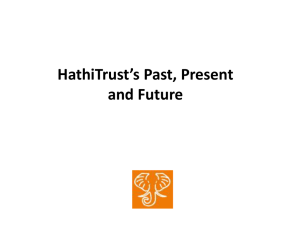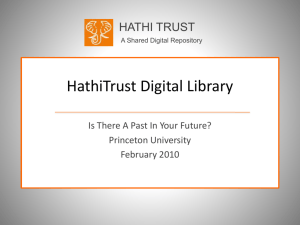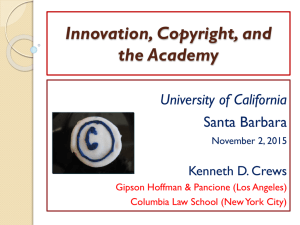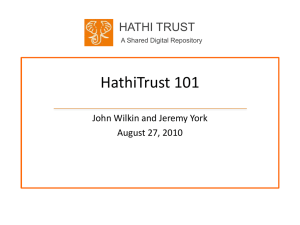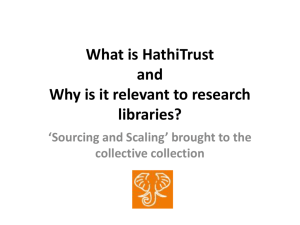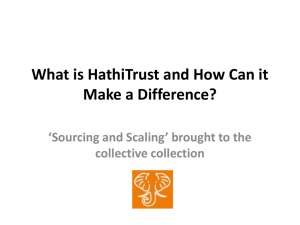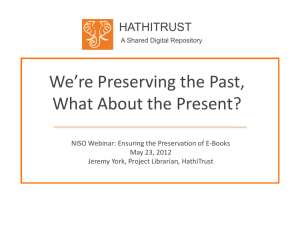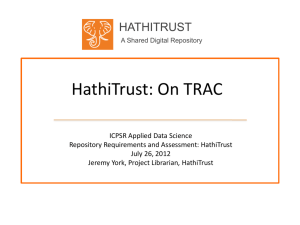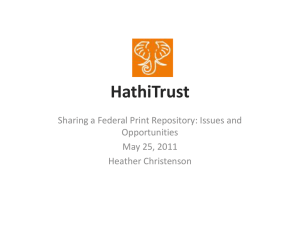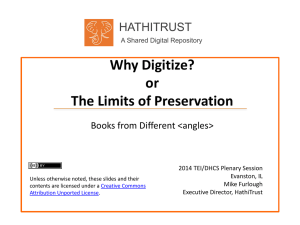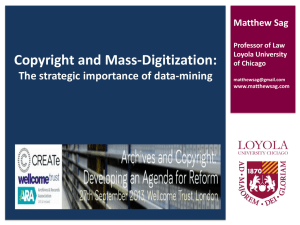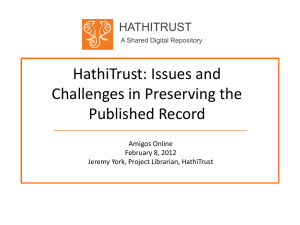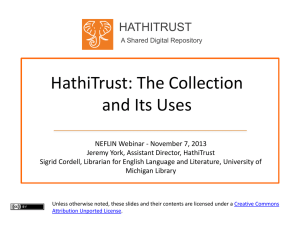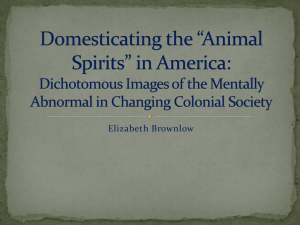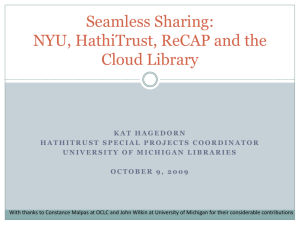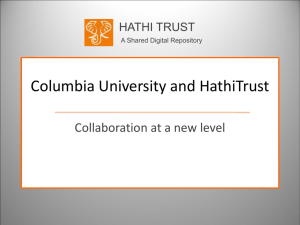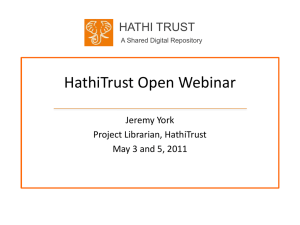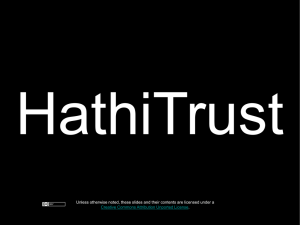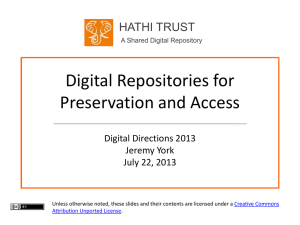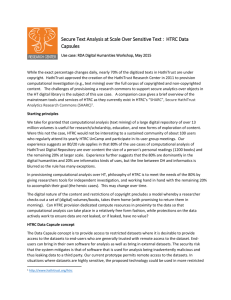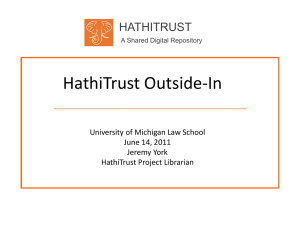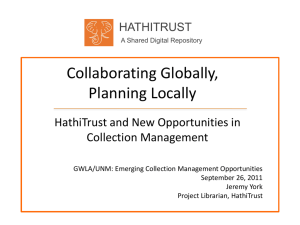709. A Loukakis
advertisement
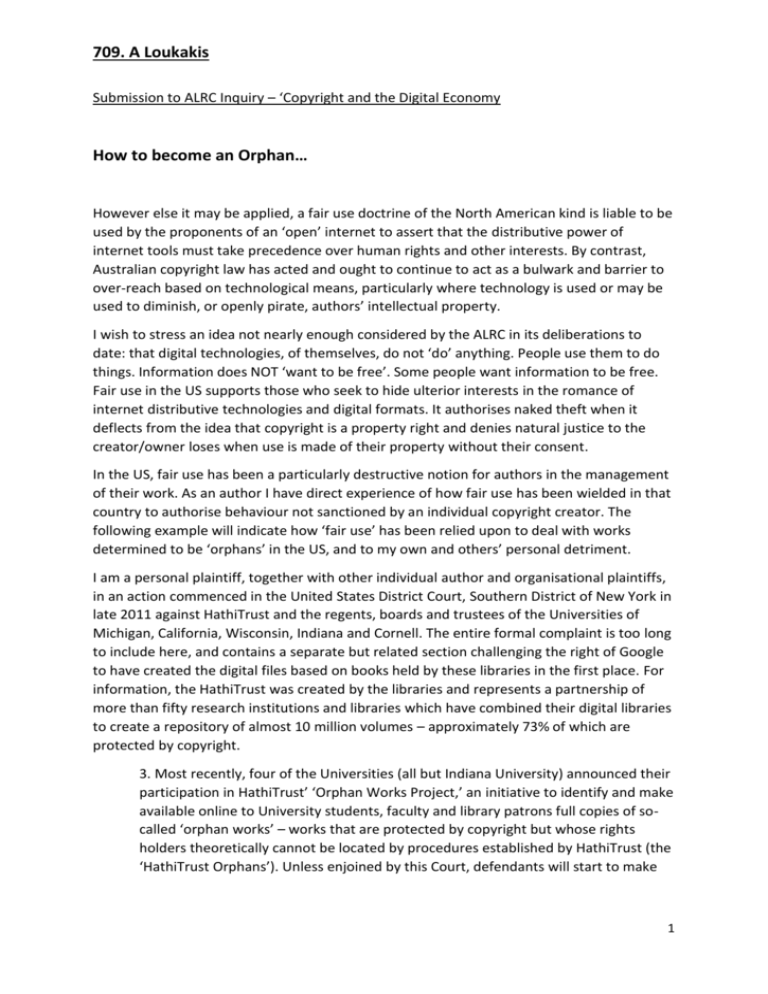
709. A Loukakis Submission to ALRC Inquiry – ‘Copyright and the Digital Economy How to become an Orphan… However else it may be applied, a fair use doctrine of the North American kind is liable to be used by the proponents of an ‘open’ internet to assert that the distributive power of internet tools must take precedence over human rights and other interests. By contrast, Australian copyright law has acted and ought to continue to act as a bulwark and barrier to over-reach based on technological means, particularly where technology is used or may be used to diminish, or openly pirate, authors’ intellectual property. I wish to stress an idea not nearly enough considered by the ALRC in its deliberations to date: that digital technologies, of themselves, do not ‘do’ anything. People use them to do things. Information does NOT ‘want to be free’. Some people want information to be free. Fair use in the US supports those who seek to hide ulterior interests in the romance of internet distributive technologies and digital formats. It authorises naked theft when it deflects from the idea that copyright is a property right and denies natural justice to the creator/owner loses when use is made of their property without their consent. In the US, fair use has been a particularly destructive notion for authors in the management of their work. As an author I have direct experience of how fair use has been wielded in that country to authorise behaviour not sanctioned by an individual copyright creator. The following example will indicate how ‘fair use’ has been relied upon to deal with works determined to be ‘orphans’ in the US, and to my own and others’ personal detriment. I am a personal plaintiff, together with other individual author and organisational plaintiffs, in an action commenced in the United States District Court, Southern District of New York in late 2011 against HathiTrust and the regents, boards and trustees of the Universities of Michigan, California, Wisconsin, Indiana and Cornell. The entire formal complaint is too long to include here, and contains a separate but related section challenging the right of Google to have created the digital files based on books held by these libraries in the first place. For information, the HathiTrust was created by the libraries and represents a partnership of more than fifty research institutions and libraries which have combined their digital libraries to create a repository of almost 10 million volumes – approximately 73% of which are protected by copyright. 3. Most recently, four of the Universities (all but Indiana University) announced their participation in HathiTrust’ ‘Orphan Works Project,’ an initiative to identify and make available online to University students, faculty and library patrons full copies of socalled ‘orphan works’ – works that are protected by copyright but whose rights holders theoretically cannot be located by procedures established by HathiTrust (the ‘HathiTrust Orphans’). Unless enjoined by this Court, defendants will start to make 1 709. A Loukakis the first set of copyright-protected HathiTrust Orphans digitally available in full text on October 13, 2011. 4. The Universities have publicly defended their unauthorised digitization activities by claiming their conduct benefits society and is permissible under the fair use doctrine set forth in Section 107 of the United States Copyright Act (the ‘Copyright Act’). This position is without legal support. Section 108 of the Copyright Act explicitly regulates the extent to which libraries may lawfully reproduce copyright works without authorization, the circumstances under which digital copies may be created and displayed to library patrons and when orphan works may be released to the public. In short, the systematic digital copying and distribution of copyrighted works by the University and HathiTrust libraries far exceeds the express limitations of Section 108, which cannot be excused by fair use under Section 107. In the event, the HathiTrust suspended its orphan works program before action could be finalised and a judgement delivered on that element by the Court. Apparently for the reason of its suspension, Judge Harold Baer refused to make a ruling. The rest of the action is ongoing. I am a plaintiff here because a collection of my short stories, Vernacular Dreams, had been copied and readied to be made available on the basis that it was an orphan work. The book, first published in 1986 by the University of Queensland Press, was not commercially available and out of print at the time of being pirated, though still available in libraries. But it was certainly not out of copyright and its author was very much alive. I was particularly incensed to have learned of this digital piracy, and for more than one reason. Firstly, I had taken the trouble over recent years to formally terminate the original publishing agreement and have my rights reverted for this title (the publisher agreed to let it go), along with two other books. My plan was to seek new publishers and reissue this and the other books. I had already organised for a new print format edition, and separately a digital version, of one other of my backlist and out of print titles (For the Patriarch), and was ready to move on to do the same with Vernacular Dreams when I was alerted to the fact I had been gazumped by Google/HathiTrust. My commercial opportunities with the new title were thus immediately compromised in the US and elsewhere – no publisher is prepared to take on a work already digitised and publicly available through another copyright territory and noncommercial distribution means. That my commercial chances were undermined in this way was one matter. Another was the distressing feeling of having a book – one that I’d worked on for years and hoped to offer again to readers for their pleasure and perhaps to earn me a few more dollars – taken away from me as if it had never been mine in the first place. Did I have no moral rights? Well, obviously not in the US. But then what of commerciality and trade? The original publishing contract that two parties had entered into, and then in a civilised manner had 2 709. A Loukakis ended to mutual satisfaction, obviously meant nothing to Google or those American universities. That no proper search had been undertaken into the provenance or ownership of this book speaks volumes itself about the absence of proper systems and safeguards. There are many other factors, of course, in the creation of this digitisation program, including corporate technology company power plays. But in large part, this derogation I suggest is also due to the broader seductiveness of particular technologies – we can do it, there don’t seem to be many reasons why not, so we will do it. But when ‘Google finds a willing bride such as this university consortium, and dangles the bauble of ‘fair use’ in front of her, the potential outcomes for literary creators is not much a new and happy marriage, but a disastrous offspring. In the end, the internet, its dependent technologies and their uses, are not unalloyed ‘social goods’. As their power for evil as well as good has come to be more and better understood, further means of regulating activity online are slowly being enacted around the world. We know that general societal and criminal laws are increasingly being used against illegal behaviour on the net. Defamation actions are more and more commenced to curb some of the personally damaging commentary appearing online in social media. Nation states are producing new rules to protect sensitive information and limit its unauthorised circulation. The Australian Copyright Act as currently constituted is still able to be applied to manage excesses against creators’ rights and property online. It should be allowed to remain efficacious in this way and not become an instrument of new and further conflict and disharmony. As for our creators, they need little more than is already in place in Australian copyright law to continue to produce and disseminate works of art, literature, beauty, and with due and proper reward to them. There is nothing broken so seriously enough in the Act to need the kind of ‘fix’ that a fair use doctrine would allegedly provide. Angelo Loukakis 3
